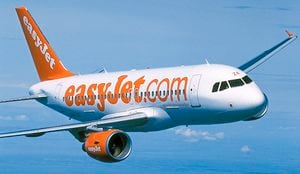EasyJet soars above strike-affected rivals
Budget airline easyJet saw passenger numbers take flight as it reaped the benefits of strikes at two of its biggest rivals.

Ryanair staff walked out last month over working conditions, leading to 250 flights being cancelled and 35,000 passengers having their plans disrupted, while British Airways lost more than 300,000 passengers in September because of strikes by pilots over their pay settlement.
And it was easyJet which stood to benefit from the disruption, and has now said it expects pre-tax profits for the year to September to clock in at the top end of previous forecasts – between £420 million and £430 million.
EasyJet also said it delivered an 8.6 per cent surge in passenger numbers to 96 million for the year after it increased its capacity by more than 10 per cent.
However, total revenue per seat slipped by around 2.7 per cent as airlines pulled prices down due to heavy consolidation in the sector – essentially meaning mergers between different carriers.
That eased in the second half of the year to 0.8 per cent, however, because of the demand created by its rivals’ strike woes.
Resilience
Chief executive Johan Lundgren said: “EasyJet has continued to perform in line with expectations, despite challenging market conditions. As a result of our self-help initiatives and the increased demand due to disruption at British Airways and Ryanair, we anticipate achieving headline profit before tax for the full year 2019 of between £420 million and £430 million.
“We have continued to invest in operational resilience, with the programme successfully reducing the impact of disruption on our operations.”
EasyJet’s cost performance remained strong during the fourth quarter, despite “difficult disruption” in the sector during the period as tour operator Thomas Cook collapsed under the weight of its huge debts last month.
Rises in fuel costs, increased capacity and the weakness in the pound resulted in a 12 per cent jump in the headline costs for the full year, the airline said.
EasyJet said cost-cutting initiatives were also a driving force behind its performance in the quarter which was affected by disruption, including storms across Europe and technical issues experienced at Gatwick Airport.
The airline said bookings for the first quarter of the 2020 full year are in line with expectations, while it expects capacity to be two per cent higher than in 2019.





